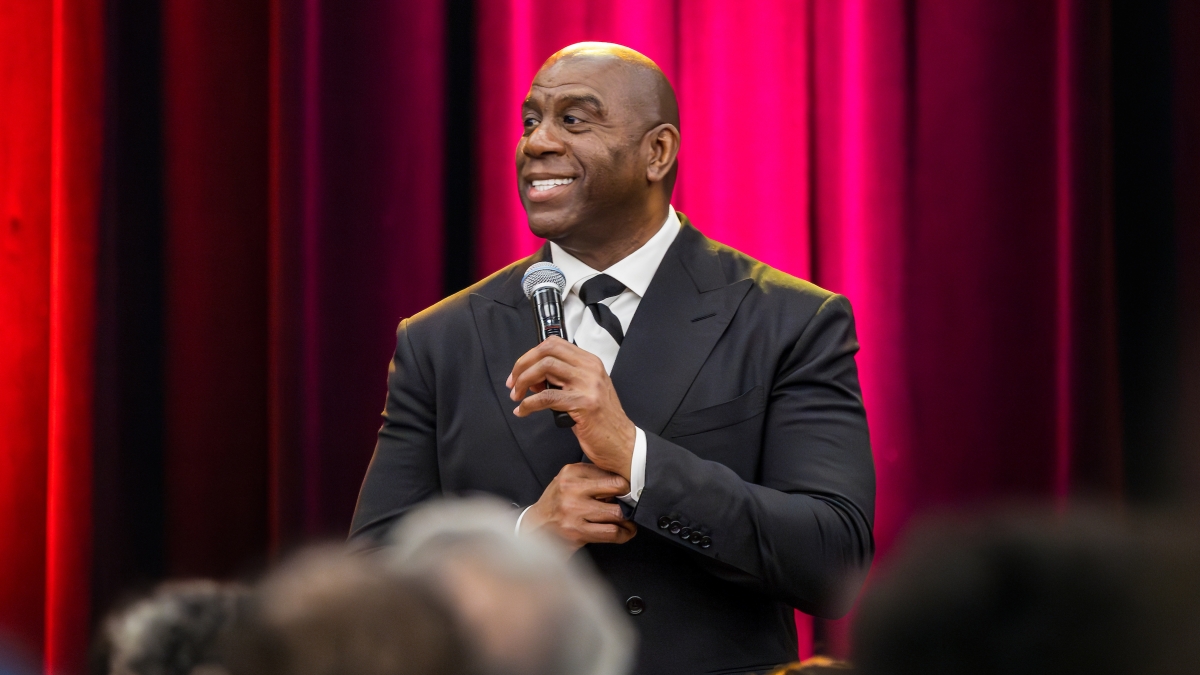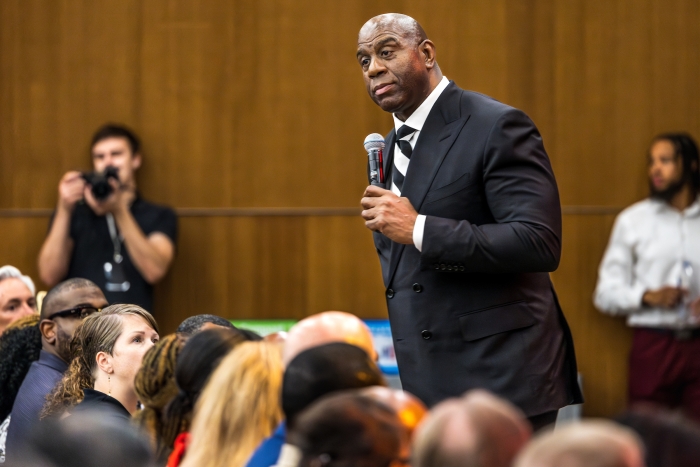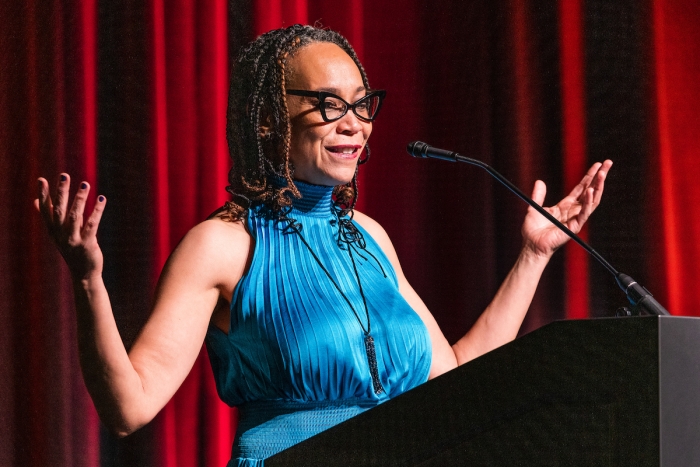Magic Johnson captivates ASU crowd in speech honoring Martin Luther King Jr.

NBA star, entrepreneur, philanthropist and health care advocate Earvin “Magic” Johnson reflects on the guidance of mentors and some of his accomplishments at the “Building History: Continuing the Legacy of Dr. Martin Luther King, Jr." event held on Monday, June 3, in ASU’s Student Pavilion. The date marked 60 years since King delivered his “Religious Witness for Human Dignity” speech at ASU’s Goodwin Stadium. Photo by Charlie Leight/ASU News
As former NBA great Earvin “Magic” Johnson neared the end of his speech Monday night honoring Martin Luther King Jr., he asked the audience of about 700 inside Arizona State University’s Student Pavilion to stand up and put their arms around the person next to them.
“Look at the room,” Johnson said. “Different people of all walks of life, different races coming together and being a blessing to one another. That’s the only thing (King) wanted. Don’t see color. Just see the person. We’re proving that right now at ASU by coming together and doing things together. This is really powerful.”
Johnson’s remarks ended a commemoration honoring the 60th anniversary of King’s June 3, 1964, speech at Goodwin Stadium, the then-home of ASU’s football team.
King’s speech, titled “Religious Witness for Human Dignity,” was delivered just days before the Civil Rights Act was passed by the U.S. Senate.
Late Monday afternoon, a groundbreaking at Durham Hall was held to introduce a continuing exhibit honoring King’s speech. The exhibit will consist of five acrylic panels that explore themes like segregation in Arizona, King’s visit to ASU, Black faith leaders, the discovery of the speech tapes and Martin Luther King Jr. Day.
“The exhibit shows how ASU had a pivotal moment in its history where it brought the religious community, the political community and the civil rights community together in a climate that wasn’t welcoming,” said Mark Brantley, assistant director of operations for the School of International Letters and Cultures. “Nevertheless, it stood on the frontier of making this happen.”
Johnson was given a standing ovation when he was introduced at about 7:15 p.m., and for the next hour he captivated the crowd by talking about his childhood, his days as an NBA Hall of Fame player and, most importantly, how his life is a testament to King’s teachings.
“I’m one of the young black men who benefited from everything that he was teaching,” Johnson said. “Everything that he was about. Everything. He went around to tell people that things had to change for the better. That it has to be a world (where) everybody is equal and treated with respect and dignity.
“The only thing that minorities wanted was an opportunity. He wanted everybody to treat them as individuals and not hate them for their race. And I benefited from that message.”
Johnson said King’s message of “coming together” and helping others was his road map to becoming a successful entrepreneur following his NBA career. Through Magic Johnson Enterprises, Johnson has poured millions of dollars into underserved communities through investments in business. One example: He opened 125 Starbucks franchises in 40 different urban markets across the country, creating job opportunities for Latinos and African Americans, he said.
Johnson told the story of his rookie season (1979–80) with the Los Angeles Lakers. He already was determined to become a businessman once his playing days ended, so he started meeting with Lakers owner Jerry Buss, “because I knew he could take me where I wanted to go.”
About a month into the season, however, Johnson’s teammates called a team meeting after practice and told him there’s an unwritten rule that players can’t hang out with the owner.
“I looked at all the 11 other guys that were sitting around me, and I said, ‘Let me get this straight. You mean to tell me that you want me to stop hanging out with a man that’s going to give me knowledge so I can take that knowledge back to the Black community and Latino community, create jobs and opportunity for them?’
“I said, ‘You guys are millionaires. He’s a billionaire. I’m hanging with the billionaire.’ True story. They got mad at me. I didn’t care. God put me in a position to do what I do, and I’m actually doing that today because of (King).”
Johnson said he has been blessed to be able to live out King’s beliefs. He is part owner of several sports franchises, including the Los Angeles Dodgers, Los Angeles Sparks and the Washington Commanders; his Magic Johnson Foundation has sent 10,000 minority youth to college, and, through his association with Starbucks, he helped create more than 2,100 jobs in minority communities and contributed an estimated $29.8 million in salaries and benefits.
“Now I own these businesses, and I’m the only Black man sitting at the table,” Johnson said. “I think about what he stood for, what he was about and how he opened these doors for a young man like myself.”
Johnson said he wishes King “was here to see all the changes that have been made,” and that one of his regrets in life is that he didn’t have the opportunity to shake King’s hand and say thank you.
King’s influence on Johnson extended not only to how he treats others, but the belief he has in himself. Johnson said too many people “get into” what people say about them rather than letting people see who they are through their work.
“Dr. King was all about peace, right?” Johnson said. “That told me a lot about the man. So, when people disrespect me or say different things, I stay a class act. I stay a man that understands who I am and understands that nobody can define who I am, what I do and what I can become.”
Johnson told the audience to pull out their cellphones and put the word “SWOT” into their notes. SWOT, he said, stands for Strength, Weakness, Opportunity and Threats.
“I want everybody in here to do a SWOT of yourself and your business,” he said. “The reason I’m successful is that I do two SWOTS, one for my company and one for me as a man. I’m always looking to grow and be better.”
After Johnson’s speech concluded, Kenja Hassan, an assistant vice president of cultural relations at ASU, asked three female students in the university’s Black African Coalition — Nia Heckler, a junior majoring in pre-medical psychology; Serenity Reynolds, a sophomore majoring in journalism; and Tajilynn Karim, a junior majoring in business — to come up to the front of the room and introduce themselves.
As soon as they were finished, Johnson grabbed a microphone and told the women he was giving each of them $25,000 for their education.
The crowd, already on its feet, applauded loudly as Heckler, Reynolds and Karim registered their complete surprise.
“I’m trying not to cry,” Heckler said a few minutes later as tears streamed down her face. “I’m just so grateful.”
“Dr. King was a leader in knowing that he would never benefit from what he was saying,” Johnson said. “He knew he was going to die. Now, it’s my job to make sure that I bless others who come behind me.”
Video by EJ Hernandez/ASU News
More Arts, humanities and education

ASU student finds connection to his family's history in dance archives
First-year graduate student Garrett Keeto was visiting the Cross-Cultural Dance Resources Collections at Arizona State University as part of a course project when he discovered something unexpected:…

ASU alumna makes her way back to the ASU Gammage stage for '¡azúcar!'
As the Los Angeles-based CONTRA-TIEMPO dance group prepares for its upcoming production “¡azúcar!” at ASU Gammage, for one member of the dance group it is also a nostalgic return to her home.Born in…

ASU FIDM professor wins international award for fantastical, sustainable creation
The horror of an ailing Earth inspired an Arizona State University fashion professor to create a fantastical garment out of sustainable, re-used and found materials that won a prestigious…

